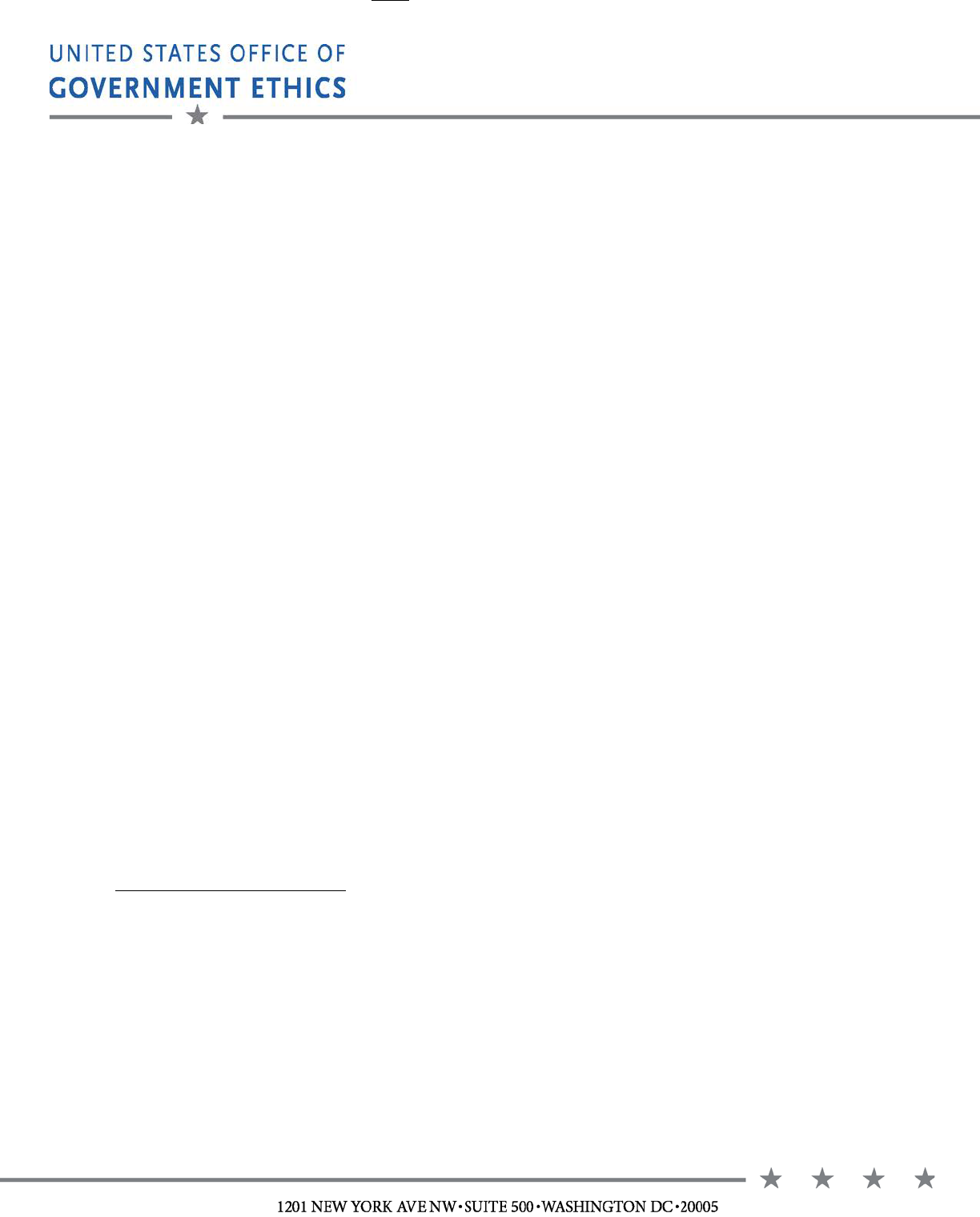
October 6, 2020
LA-20-07
LEGAL ADVISORY
TO: Designated Agency Ethics Officials
FROM: Emory A. Rounds, III
Director
SUBJECT: Answers to Frequently Asked Questions for Employees Engaged in
Crowdsourced Fundraising
The purpose of this Legal Advisory is to assist ethics officials and employees in
navigating the complex, emerging ethics issues related to crowdsourced fundraising. This
Advisory expands on previous guidance
1
from the U.S. Office of Government Ethics (OGE) by
answering common questions that employees may have regarding this method of fundraising.
2
Crowdsourced fundraising, or “crowdfunding,” is the practice of obtaining needed
funding by soliciting contributions from a large number of people. This Legal Advisory will
focus on crowdsourced fundraising from the online community, usually through social media or
on a dedicated crowdfunding platform (for example, GiveSmart, GoFundMe, IndieGoGo, or
Kickstarter).
While crowdsourced fundraising
is not strictly prohibited by the gift rules, the nature of
this type of fundraising is complex and demands that extra care be taken to ensure that federal
employees do not solicit or accept prohibited gifts. Employees should work closely with their
agency ethics officials to determine whether crowdsourced donations were given by a prohibited
source
3
or because of their official position, and, if so, to determine whether any exception to the
1
OGE’s previous guidance discussed crowdsourcing specifically in the context of furloughed federal employees,
although much of the guidance is generally applicable. OGE Legal Advisory LA-19-01 (Feb. 15, 2019).
2
As used in this Legal Advisory, the term “fundraising” is not limited to the specific definition provided in 5 C.F.R.
§ 2635.808(a)(1), except when that definition is invoked in the response to Question 7. Further, nothing in this
Advisory is intended to apply to the Combined Federal Campaign, which is managed by the Office of Personnel
Management and governed by its own regulations. See 5 C.F.R. pt. 950.
3
The term “prohibited source” is defined as “any person who (1) [i]s seeking official action by the employee’s
agency; (2) [d]oes business or seeks to do business with the employee’s agency; (3) [c]onducts activities regulated
by the employee’s agency; (4) [h]as interests that may be substantially affected by the performance or
nonperformance of the employee’s official duties; or (5) [i]s an organization the majority of whose members are
described in” the four preceding clauses. 5 C.F.R. § 2635.203(d).
(1
) Executive Order 13770, which is cited in footnote 31, has been revoked.
Executive Order 13989 contains an identical provision (sec. 1, para. 1).
.(2) Among other changes to the Standards of Conduct effective August 15, 2024,
OGE updated language to make clear that the 2635.302(b) restriction on
accepting gifts from employees receiving less pay does not apply to a gift from a
superior to a subordinate employee. See 89 FR 43686 and LA-24-06.
Notes:

2
gift rules applies. The guidance provided below is not a substitute for an employee speaking with
an ethics official about any crowdsourcing concerns.
1. What general principles should I keep in mind when considering starting a
crowdsourced fundraising campaign?
The gift rules apply equally to crowdsourced donations. Specifically, you may not solicit
or accept gifts from a prohibited source or given because of your official position,
4
unless a
relevant exception applies. Evaluating whether a crowdsourced gift is given because of official
position or from a prohibited source, or whether an exception applies, can be complex.
a) May I solicit or accept crowdsourced donations from close friends and family?
Most likely, yes. You may solicit or accept a gift from an individual under circumstances
which make it clear that the gift is motivated by a family relationship or personal friendship
rather than your federal position.
5
This personal relationship exception extends to donations
given via online fundraising tools. For example, if you create a crowdsourced fundraiser to help
pay for unexpected home repair expenses after a storm and your best friend from college
contributes to your campaign, you may likely accept that gift, even if your friend is a prohibited
source because their employer is regulated by your agency. In fact, sending notice of a
crowdfunding campaign only to close friends and family, rather than publicly posting it online,
may effectively limit the donor pool to individuals from whom you may accept gifts.
However, you must carefully evaluate the relevant factors to determine the motivation of
any donation, including those from friends and family.
6
The most important factor is whether the
donor has any reason to be motivated to donate due to your official position. Other relevant
factors include the history and nature of the relationship and whether the family member or
friend personally pays for the gift.
7
If a prohibited source who does not qualify for the personal relationship exception or
other exception donates to your crowdsourcing campaign, you must promptly return the
donation.
8
In addition, if a donor who qualifies for the personal relationship exception does
business before the agency, you should still consider whether accepting the gift could lead to an
appearance of favoritism in government decision-making.
9
b) When is a crowdsourced donation given because of my official position?
A gift is given because of your official position if it would not have been given if you did
not hold the status, authorities, or duties associated with your federal position.
10
Whether a
4
5 C.F.R. §§ 2635.201(a), .202.
5
5 C.F.R. § 2635.204(b).
6
Id.
7
Id.; see also OGE Inf. Adv. Op. 06x3 (Mar. 20, 2006).
8
Disposition of prohibited gifts is governed by 5 C.F.R. § 2635.206.
9
5 C.F.R. §§ 2635.201(b), .702(d). When your relationship with another person is close enough to support the
application of the personal relationship exception, it may also warrant your recusal from official matters affecting
the other person. See 5 C.F.R. § 2635.502(a).
10
See 5 C.F.R. § 2635.203(e).

3
particular gift is given because of your official position is determined based on all relevant
circumstances, including the content of your solicitation. A strong inference that a gift is given
based on your official position will normally arise if the solicitation directly ties your intended
use of donations to your federal job – for example, if you solicit funds specifically to pay for a
professional certification that will qualify you for a promotion at your agency. Similar concerns
arise if you highlight your federal position in the solicitation, as discussed below (Question 2).
c) How can I identify donations from prohibited sources?
It is very possible to unknowingly accept donations from prohibited sources because it is
not always easy to identify who has business before, or is regulated by, your agency.
11
This is
made even more challenging because an individual is considered a prohibited source if the
individual is employed by a prohibited source.
12
For example, if your agency regulates the Acme
Company, then any online donor who works for Acme would be deemed a prohibited source for
you. Because internet donation sites usually only reveal limited information about the donor, you
must work closely with your ethics official to screen out donations from likely prohibited
sources. This screening effort is important for all employees, and especially for high-level
employees who can meaningfully influence agency actions.
While crowdsourced donations ordinarily are not anonymous, crowdsourcing websites
generally do not permit campaign organizers to request specific information, such as the donor’s
employer.
13
Therefore, if you do not know the donor’s employer and you have independent
information indicating that the donor either is or is employed by a prohibited source, you may
need to contact the donor directly
14
to gather additional information. You can then work with
your ethics official to determine whether the donor is a prohibited source prior to accepting the
gift. While this approach may seem onerous, such reviews are only required for donations that do
not otherwise qualify for an applicable gift exception. Donations from family and close friends,
for example, can generally be accepted under the personal relationship exception (as discussed
above under Question 1(a)).
15
Regardless of who is likely to be contributing to your crowdsourced funding campaign,
OGE strongly recommends you refrain from withdrawing funds from a crowdsourcing campaign
until you have received ethics counseling on crowdsourcing. When receiving this initial
guidance, you should also discuss circumstances under which additional counseling would be
recommended. For example, ethics officials may advise you to contact them again whenever you
are uncertain about whether you may accept a specific individual donation.
11
See supra note 3 (providing the definition of “prohibited source”).
12
5 C.F.R. § 2635.102(k); see also id. § 2635.204(a) ex.3.
13
This information is from two crowdsourcing websites’ responses to OGE’s technical questions.
14
If the website shares the donor’s email address, the employee may contact the donor by email. If it does not, the
website may have a function to contact donors through the website.
15
5 C.F.R. § 2635.204(b).

4
2. May I reference my federal position when crowdsourcing for a personal issue?
Generally, no. You may not use your government position or title to induce a benefit,
16
nor may you refer to your official position in an online solicitation in any manner that would,
under all the circumstances, cause a reasonable person to conclude that the government sanctions
or endorses your solicitation.
17
Thus, whether your crowdsourcing campaign is related to or
entirely unrelated to your federal position, you must take care in discussing your government
employment to avoid running afoul of the prohibition against soliciting a gift to be given because
of your official position.
18
Under this prohibition, it would nearly always be inappropriate to ask people to donate
because you are a federal employee – for example, “I cannot pay these hospital bills because I
serve my country as an underpaid federal employee!” A less explicit solicitation based on your
government position, such as a picture of yourself in a military uniform on a crowdsourcing page
set up to assist you with car repairs, may also raise concerns, depending on the totality of the
circumstances.
19
3. May I accept donations from a crowdsourced fundraising campaign started by
others for my benefit?
It depends. The rules outlined above apply to all campaigns on behalf of a federal
employee, even if the campaign is organized by people who are not federal employees.
20
For
example, if you are an overseas military service member, and your spouse starts a crowdsourcing
campaign to raise money for your plane ticket home for Christmas, you will need to ensure the
campaign adheres to the ethics rules. Accordingly, you will need to closely coordinate with both
the campaign organizer and your ethics official. Such coordination is necessary to ensure that
your federal position is not used by another to induce a benefit, that donations are not made
because of your official position, and that any donations are properly screened for prohibited
sources. (See Question 1 and Question 2 above.)
4. May I accept donations from large-scale crowdsourcing campaigns?
In some cases. If you are eligible as a recipient because assistance is offered to a broad
class of government employees that does not discriminate based on responsibility or rate of pay
(such as all government employees who are furloughed) and if the campaign organizer is not a
prohibited source, then you may accept the donation.
21
Additionally, if you are eligible as a
recipient for a reason unrelated to your government employment, then you may accept the
donation.
22
For example, if a crowdsourcing campaign is established to help the victims of a
16
5 C.F.R. § 2635.702(a).
17
See OGE Legal Advisory LA-14-08 (Nov. 19, 2014); see also OGE Legal Advisory LA-15-03, at 2 (Apr. 9,
2015).
18
Other restrictions relating to misuse of position may also apply in this context. See 5 C.F.R. pt. 2635, subpt. G.
19
See OGE Legal Advisory LA-14-08, at 3.
20
See 5 C.F.R. § 2635.203(f) (defining “indirectly solicited or accepted”).
21
5 C.F.R. § 2635.204(c)(2)(iii); OGE Legal Advisory LA-19-01.
22
5 C.F.R. § 2635.204(c)(2)(i).

5
natural disaster, an employee affected by the disaster may permissibly accept donations from the
campaign.
5. Are there financial disclosure requirements for crowdsourced fundraising
donations?
Yes. If you are a financial disclosure filer, your annual report must include any gifts
aggregating over the reporting threshold (currently $415) received from a single source during
the reporting period.
23
This financial disclosure requirement includes donations received through
crowdsourced fundraising campaigns. It may be prudent for public filers considering a
crowdsourced fundraising campaign to notify potential donors that their identity will be listed on
a publicly available financial disclosure report if the donation exceeds the reporting threshold.
6. May I use crowdsourced fundraising to solicit in-office contributions for a fellow
employee?
Generally, no. You may not give a gift to or solicit a contribution from another employee
for a gift to an official superior.
24
While there are certain situations that qualify for the special,
infrequent occasions exception,
25
such as a personal illness or family tragedy, the exception
requires that the gift be voluntary and of a nominal amount.
26
An online crowdsourcing appeal that is intended to benefit a federal employee and is
specifically targeted to other federal employees would be problematic for a variety of reasons.
First, the public nature of crowdsourced fundraising platforms, which often list the names and
donation amounts of donors, can create inappropriate pressure for employees to donate. Further,
the one-size-fits-all nature of crowdsourcing websites does not account for the fact that ethics
rules apply differently to different employees: gifts from subordinate employees or those making
less pay than the recipient are restricted, while gifts from superior employees or those making
more pay are not. Finally, if your workplace includes contractor employees, they are prohibited
sources, so you must be careful to screen out impermissible donations from them. Since there are
other ways to raise funds at your office to help a co-worker in need, OGE advises against using
crowdsourcing platforms to solicit in-office contributions for a fellow employee.
7. May I use crowdsourced fundraising to create a fundraiser for someone else?
It depends. Federal ethics rules apply only to federal employees.
27
If you are careful to
designate that someone else (who is not a federal employee) is the beneficiary of the campaign,
you could potentially create a crowdsourced fundraiser for that person. However, you must not
23
5 C.F.R. §§ 2634.304, .907(g). When reporting gifts, you should report the individual donors who contribute to a
crowdsourced fundraising campaign.
24
5 C.F.R. § 2635.302(a). We also note that you often may not accept gifts from employees making less pay. Id.
§ 2635.302(b).
25
5 C.F.R. § 2635.304(b).
26
Id. § 2635.304(c).
27
Id. § 2635.102(a), (h).

6
use your government position to induce another person to donate to your friends or relatives.
28
Moreover, if you are engaging in crowdsourced fundraising on behalf of a nonprofit
organization, rather than on behalf of specific individuals, this activity is regulated by the
fundraising section of the Standards of Ethical Conduct for Employees of the Executive
Branch.
29
Irrespective of the intended beneficiary of your crowdsourced funding campaign, you
should avoid references to the federal workplace and your official position. Furthermore, you are
generally prohibited from using official resources – including work time or government
equipment – to support your campaign.
30
8. Are there additional considerations if I am an appointee who signed the Ethics
Pledge?
Yes. If you are an appointee who signs the Ethics Pledge, you also may not accept gifts
from registered lobbyists or lobbying organizations.
31
These restrictions require additional
screening and assistance from your ethics official prior to soliciting and/or accepting any gift
given to you as part of a crowdsourcing campaign.
9. Are there any other issues to consider when accepting gifts from crowdsourced
fundraising campaigns?
Yes. A criminal law, 18 U.S.C. § 209(a), prohibits employees from receiving any
contribution to or supplementation of salary as compensation for their services as an employee.
However, the Department of Justice’s Office of Legal Counsel (OLC) has previously found that
payments (in that instance, limited to terminally ill children or grandchildren of present or former
employees of a federal agency) that were motivated by sympathy, rather than an intent to compensate
the employee for the employee’s government service, did not violate this law.
32
Donations made to
federal employees who are not in a position to influence the government on behalf of the payor
would generally appear to be motivated by sympathy unless there is some clear indication to the
contrary. If employees have concerns, they should discuss their concerns with their ethics official.
28
5 C.F.R. § 2635.702(a); see also id. §§ 2635.202(a), .203(f) (restricting employees from soliciting gifts to benefit
certain recipients designated by the employees).
29
5 C.F.R. § 2635.808(c).
30
Id. §§ 2635.704, .705.
31
Exec. Order. No. 13,770, sec. 1, para. 5.
32
Applicability of 18 U.S.C. § 209 to Acceptance by FBI Employees of Benefits Under the “Make a Dream Come
True” Program, 21 Op. O.L.C. 204 (1997); see also OGE Legal Advisory LA-19-01, at 4.
